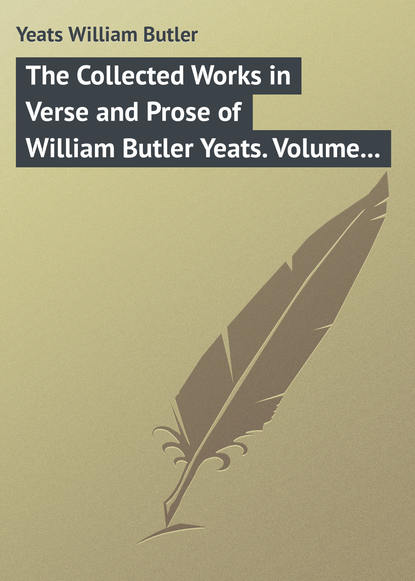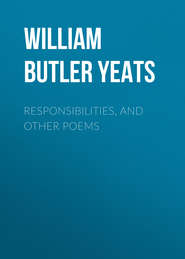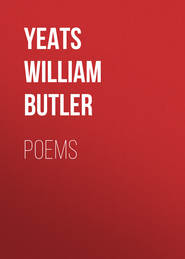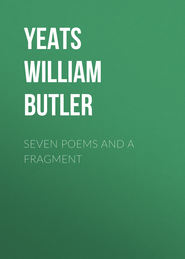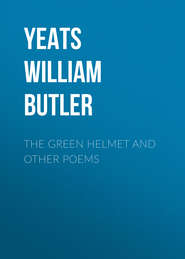По всем вопросам обращайтесь на: info@litportal.ru
(©) 2003-2024.
✖
The Collected Works in Verse and Prose of William Butler Yeats. Volume 3 of 8. The Countess Cathleen. The Land of Heart's Desire. The Unicorn from the Stars
Настройки чтения
Размер шрифта
Высота строк
Поля
Oh, he is down!
FATHER JOHN
He is shot through the breast. Oh, who has dared meddle with a soul that was in the tumults on the threshold of sanctity?
JOHNNY
It was that gun went off and I striking it from the constable’s hand.
MARTIN
[Looking at his hand, on which there is blood.]
Ah, that is blood! I fell among the rocks. It is a hard climb. It is a long climb to the vineyards of Eden. Help me up. I must go on. The Mountain of Abiegnos is very high – but the vineyards – the vineyards!
[He falls back dead. The men uncover their heads.
PAUDEEN [to BIDDY]
It was you misled him with your foretelling that he was coming within the best day of his life.
JOHNNY
Madness on him or no madness, I will not leave that body to the law to be buried with a dog’s burial or brought away and maybe hanged upon a tree. Lift him on the sacks, bring him away to the quarry; it is there on the hillside the boys will give him a great burying, coming on horses and bearing white rods in their hands.
[NANNY lays the velvet cloak over him.
They lift him and carry the body away singing:
Our hope and our darling, our heart dies with you,
You to have failed us, we are foals astray!
FATHER JOHN
He is gone and we can never know where that vision came from. I cannot know – the wise Bishops would have known.
THOMAS [taking up banner]
To be shaping a lad through his lifetime, and he to go his own way at the last, and a queer way. It is very queer the world itself is, whatever shape was put upon it at the first.
ANDREW
To be too headstrong and too open, that is the beginning of trouble. To keep to yourself the thing that you know, and to do in quiet the thing you want to do. There would be no disturbance at all in the world, all people to bear that in mind!
APPENDIX
THE COUNTESS CATHLEEN
Preface to the Fourth Edition
The present version of The Countess Cathleen is not quite the version adopted by the Irish Literary Theatre a couple of years ago, for our stage and scenery were capable of little; and it may differ still more from any stage version I make in future, for it seems that my people of the waters and my unhappy dead, in the third act, cannot keep their supernatural essence, but must put on too much of our mortality, in any ordinary theatre. I am told that I must abandon a meaning or two and make my merchants carry away the treasure themselves. The act was written long ago, when I had seen so few plays that I took pleasure in stage effects. Indeed, I am not yet certain that a wealthy theatre could not shape it to an impressive pageantry, or that a theatre without any wealth could not lift it out of pageantry into the mind, with a dim curtain, and some dimly robed actors, and the beautiful voices that should be as important in poetical as in musical drama. The Elizabethan stage was so little imprisoned in material circumstance that the Elizabethan imagination was not strained by god or spirit, nor even by Echo herself – no, not even when she answered, as in The Duchess of Malfi, in clear, loud words which were not the words that had been spoken to her. We have made a prison-house of paint and canvas, where we have as little freedom as under our own roofs, for there is no freedom in a house that has been made with hands. All art moves in the cave of the Chimæra, or in the garden of the Hesperides, or in the more silent house of the gods, and neither cave, nor garden, nor house can show itself clearly but to the mind’s eye.
Besides re-writing a lyric or two, I have much enlarged the note on The Countess Cathleen, as there has been some discussion in Ireland about the origin of the story, but the other notes[1 - I have left them out of this edition as Lady Gregory’s Cuchulain of Muirthemne and Gods and Fighting Men have made them unnecessary. When I began to write, the names of the Irish heroes were almost unknown even in Ireland.] are as they have always been. They are short enough, but I do not think that anybody who knows modern poetry will find obscurities in this book. In any case, I must leave my myths and symbols to explain themselves as the years go by and one poem lights up another, and the stories that friends, and one friend in particular, have gathered for me, or that I have gathered myself in many cottages, find their way into the light. I would, if I could, add to that great and complicated inheritance of images which written literature has substituted for the greater and more complex inheritance of spoken tradition, to that majestic heraldry of the poets some new heraldic images gathered from the lips of the common people. Christianity and the old nature faith have lain down side by side in the cottages, and I would proclaim that peace as loudly as I can among the kingdoms of poetry, where there is no peace that is not joyous, no battle that does not give life instead of death; I may even try to persuade others, in more sober prose, that there can be no language more worthy of poetry and of the meditation of the soul than that which has been made, or can be made, out of a subtlety of desire, an emotion of sacrifice, a delight in order, that are perhaps Christian, and myths and images that mirror the energies of woods and streams, and of their wild creatures. Has any part of that majestic heraldry of the poets had a very different fountain? Is it not the ritual of the marriage of heaven and earth?
These details may seem to many unnecessary; but after all one writes poetry for a few careful readers and for a few friends, who will not consider such details very unnecessary. When Cimabue had the cry it was, it seems, worth thinking of those that run; but to-day, when they can write as well as read, one can sit with one’s companions under the hedgerow contentedly. If one writes well and has the patience, somebody will come from among the runners and read what one has written quickly, and go away quickly, and write out as much as he can remember in the language of the highway.
W. B. YEATS.
January, 1901.
NOTES
The Countess Cathleen.– I found the story of the Countess Cathleen in what professed to be a collection of Irish folklore in an Irish newspaper some years ago. I wrote to the compiler, asking about its source, but got no answer, but have since heard that it was translated from Les Matinées de Timothé Trimm a good many years ago, and has been drifting about the Irish press ever since. Léo Lespès gives it as an Irish story, and though the editor of Folklore has kindly advertised for information, the only Christian variant I know of is a Donegal tale, given by Mr. Larminie in his West Irish Folk Tales and Romances, of a woman who goes to hell for ten years to save her husband and stays there another ten, having been granted permission to carry away as many souls as could cling to her skirt. Léo Lespès may have added a few details, but I have no doubt of the essential antiquity of what seems to me the most impressive form of one of the supreme parables of the world. The parable came to the Greeks in the sacrifice of Alcestis, but her sacrifice was less overwhelming, less apparently irremediable. Léo Lespès tells the story as follows: —
‘Ce que je vais vous dire est un récit du carême Irlandais. Le boiteux, l’aveugle, le paralytique des rues de Dublin ou de Limerick, vous le diraient mieux que moi, cher lecteur, si vous alliez le leur demander, un sixpence d’argent à la main. – Il n’est pas une jeune fille catholique à laquelle on ne l’ait appris, pendant les jours de préparation à la communion sainte, pas un berger des bords de la Blackwater qui ne le puisse redire à la veillée.
‘Il y a bien longtemps qu’il apparut tout-à-coup dans la vieille Irlande deux marchands inconnus dont personne n’avait ouï parler, et qui parlaient néanmoins avec la plus grande perfection la langue du pays. Leurs cheveux étaient noirs et ferrés avec de l’or et leurs robes d’une grande magnificence.
Tous deux semblaient avoir le même âge: ils paraissaient être des hommes de cinquante ans, car leur barbe grisonnait un peu.
Or, à cette époque, comme aujourd’hui, l’Irlande était pauvre, car le soleil avait été rare, et des récoltes presque nulles. Les indigents ne savaient à quel saint se vouer, et la misère devenait de plus en plus terrible.
Dans l’hôtellerie où descendirent les marchands fastueux on chercha à pénétrer leurs desseins: mais ce fut en vain, ils demeurèrent silencieux et discrets.
Et pendant qu’ils demeurèrent dans l’hôtellerie, ils ne cessèrent de compter et de recompter des sacs de pièces d’or, dont la vive clarté s’apercevait à travers les vitres du logis.
Gentlemen, leur dit l’hôtesse un jour, d’où vient que vous êtes si opulents, et que, venus pour secourir la misère publique, vous ne fassiez pas de bonnes œuvres?
– Belle hôtesse, répondit l’un d’eux, nous n’avons pas voulu aller au-devant d’infortunes honorables, dans la crainte d’être trompés par des misères fictives: que la douleur frappe à la porte, nous ouvrirons.
Le lendemain, quand on sut qu’il existait deux opulents étrangers prêts à prodiguer l’or, la foule assiégea leur logis; mais les figures des gens qui en sortaient étaient bien diverses. Les uns avaient la fierté dans le regard, les autres portaient la honte au front. Les deux trafiquants achetaient des âmes pour le démon. L’âme d’un vieillard valait vingt pièces d’or, pas un penny de plus; car Satan avait eu le temps d’y former hypothèque. L’âme d’une épouse en valait cinquante quand elle était jolie, ou cent quand elle était laide. L’âme d’une jeune fille se payait des prix fous: les fleurs les plus belles et les plus pures sont les plus chères.
Pendant ce temps, il existait dans la ville un ange de beauté, la comtesse Ketty O’Donnor. Elle était l’idole du peuple, et la providence des indigents. Dès qu’elle eut appris que des mécréants profitaient de la misère publique pour dérober des cœurs à Dieu, elle fit appeler son majordome.
– Master Patrick, lui dit elle, combien ai-je de pièces d’or dans mon coffre?
– Cent mille.
– Combien de bijoux?
– Pour autant d’argent.
– Combien de châteaux, de bois et de terres?
– Pour le double de ces sommes.
– Eh bien! Patrick, vendez tout ce qui n’est pas or et apportez-m’en le montant. Je ne veux garder à moi que ce castel et le champ qui l’entoure.





